Arjuna, disciple of Krishna
by Aldolinor Teodorescu
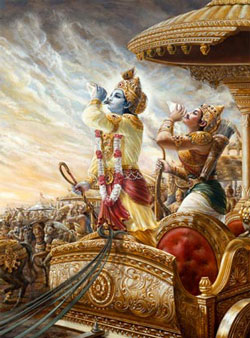 Gods, goddesses, mythical worlds, paradises, epic battles between good and evil, extraordinary powers, legendary and endless love stories – we look into these superlative worlds and intuitively, we feel their profound reality, one hair away from us, or even closer. Other times, our faith decreases and we believe they are figments of our imagination, but what could we imagine, that isn’t already in the endless and mysterious mind of God?
Gods, goddesses, mythical worlds, paradises, epic battles between good and evil, extraordinary powers, legendary and endless love stories – we look into these superlative worlds and intuitively, we feel their profound reality, one hair away from us, or even closer. Other times, our faith decreases and we believe they are figments of our imagination, but what could we imagine, that isn’t already in the endless and mysterious mind of God?
We are blessed, for we are guided by an unseen force on the unsuspected thread of life and we come to meet exceptional human beings, shattering revelations and moments when we humbly feel pervaded by a force that is one with the whole universe. Human passions, alchemized and returned to their trans-personal, macrocosmic cause, the surprise of discovering divine perspectives pointing us to the same universe, but seen from a much wider perspective, results we don’t think we’re capable of and yet, here they are. We are encouraged to move on further, and even if we barely made the first small step, we wonder, with legitimate curiosity: What is the limit? What was the limit reached by other seekers and, especially, how did they get there? And thus, we are already on the path…
The journey
In our spiritual journey, we inevitably go through a series of stages, existential conditions, each of them bearing the sign of a certain inner achievement, a completion necessary to our soul, which soars upward and upward, always aspiring to the next step of our coming to God. Matching our efforts, each of us seeks to amplify particular qualities within himself, higher and higher resonances which structure themselves within our being as real portals to the Kingdom of the Heavenly Father.
Aspiring to a completion of our being, we evolve due to certain divine energies on which we insisted during our evolution, during the many incarnations and thus, growing them to maturity within our inner universe, they constitute themselves into extremely capable “engines” that propel us forward, towards God, with great speed.
Thus, many of us awaken an exceptional courage and they explore the divine possibilities they have in every moment with unstoppable curiosity. Others predominant energy is love and they end up actively comprising in their aura more and more of the different beings and phenomena, nearby or far away. Others awaken their divine virility (or respectively, their femininity) and with it, more and more of its aspects, thus experiencing an intense uplifting polarization in every moment of their lives. Others head straight to God Himself, with lightning speed.
Whatever our particular path might be, those examples that pass the test of time can represent significant sources of inspiration for us and opportunities to objectivize and learn. Here are a few excerpts from the life of a disciple whose attitudes and accomplishments can constitute a genuine role model for us.
Arjuna – the disciple
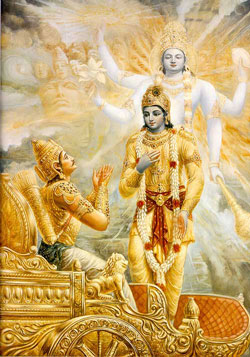 Arjuna lived a few thousand years ago but, aside from the historical context, one might say that his experiences are depicted from our contemporary world. He was the third sun of the Pandava family of kings and, together with Krishna, he is the hero of the Indian saga of Mahabharata. He is especially known due to the fact that he is the one chosen by Krishna to tell his initiatic teachings from the Bhagavad Gita.
Arjuna lived a few thousand years ago but, aside from the historical context, one might say that his experiences are depicted from our contemporary world. He was the third sun of the Pandava family of kings and, together with Krishna, he is the hero of the Indian saga of Mahabharata. He is especially known due to the fact that he is the one chosen by Krishna to tell his initiatic teachings from the Bhagavad Gita.
The Sanskrit word arjuna means white, clear, bright (the color of daylight, of dawn and lightning in the Rig Veda). The hero’s name is an indicative of his mental and supramental qualities. Although he embodies the qualities of the warrior, Ksatriya, the invincible conqueror, being often celebrated as such, this time we will look at Arjuna from a different perspective – that of the disciple.
We will take a look at his relationship and attitude towards his spiritual guide and spiritual practice. What were the qualities that turned him into the most beloved human being by his spiritual master, Krishna, what attributes turned him into the object of ceaseless divine Grace and guidance?
The first years
From a very young age, Arjuna was given, together with the other princes of the royal families, to the great teacher and warrior Dronachariya, for instruction in the art of weapons, an ability which is indispensable for the kings of those times. Arjuna stood out quickly as the most dedicated, the most hardworking and finally, as the most talented of the disciples. Even though he was only a child, Arjuna served his master with loyalty and he was very impressed by his student’s devotion.
Here are a few stories that emphasize the awakening of the many qualities in Arjuna, in the context of his education.
Courage and vigilance
Arjuna surpassed the expectations of Dronachariya in many of the trials. When he tested the princes’ vigilance by creating the illusion of a crocodile that attacked him and grabbed him, most of the princes were stunned, incapable of any adequate reaction. Unlike them, Arjuna immediately began shooting arrows at the fierce animal and Dronachariya congratulated him for passing the test. As a reward, he initiated Arjuna in a mantra which allowed him to invoke the amazingly efficient divine weapon called Brahmaastra and he warned Arjuna not to use this powerful weapon against any ordinary warrior.
Awakening the chakras and mastering the subtle elements
In another attempt, Dronachariya gave each prince a vessel and asked them to fill the vessels with water and then return the vessels as quickly as possible. The one who came back first with the vessel would receive an initiation in a special type of knowledge. He gave his son, Ashvatthama a wide-neck vessel, which was different from the other vessels with a narrow neck, hoping that in this way he will be able to fill the vessel faster and thus return first. But Arjuna made use of his knowledge and used a mystical way of invoking water so he rapidly filled his vessel and returned first, in spite of the unfair competition.
Focusing power
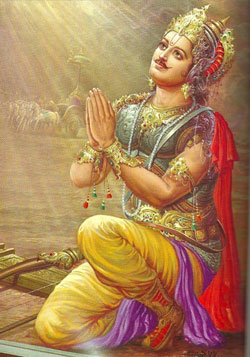 During a competition, Dronachariya placed a wooden bird among the leaves of a tree and then he stood himself on the other side of the river, together with his students. He asked them to make the bird fall by hitting it in her tiny eye. The students were confident of their success, because they had already killed ferocious animals in the past and they considered that a bird would be not much of a challenge for them. They impatiently waited to be called by the teacher, one by one. The first one who stood next to Dronachariya and raised his bow was Yudishthira and then Drona asked him: “Can you see the bird properly? Tell me what you see.”
During a competition, Dronachariya placed a wooden bird among the leaves of a tree and then he stood himself on the other side of the river, together with his students. He asked them to make the bird fall by hitting it in her tiny eye. The students were confident of their success, because they had already killed ferocious animals in the past and they considered that a bird would be not much of a challenge for them. They impatiently waited to be called by the teacher, one by one. The first one who stood next to Dronachariya and raised his bow was Yudishthira and then Drona asked him: “Can you see the bird properly? Tell me what you see.”
Yudhishthira answered: “I see a wooden bird, the branch it is sitting on and the tree. I see the leaves moving and even several other birds in the same tree. I see the river, the grass, other trees, the sky…” “Put down your bow and sit down, Yudhisthira”, said Dronachariya, “you won’t hit the eye of the bird.” The next in line was Karna, but his answers were similar, simply stating all the things he could see. Again, he was asked to put down his bow. The same thing happened with each of the disciples, until Arjuna’s turn came. Dronachariya smiled cleverly while
Arjuna was preparing his bow and then gave him the rope. “Tell me what you see”, he asked. “The only thing I see is the bird’s eye” said Arjuna, without losing focus on his target for not even a second. “But you cannot see the trees and the sky? Or at least the branch the bird is sitting on?”, asked his mentor. “No, master, I’m only seeing its eye and nothing else” said Arjuna, holding his bow and eyes still. Dronachariya was satisfied with this answer. He looked at the other boys who were silent. They started to understand the lesson. “Shoot”, he said to Arjuna, and the wooden bird fell with an arrow shot right in the eye.
“This is the power of concentration”, said Drona being happy with his disciple.
Spiritual aspiration, the desire for knowledge and self-improvement
One day, Arjuna noticed his brother, Bhima, was eating in complete darkness. Bhima’s hands never missed his mouth, in other words, the target. Bhima answered saying that his hands have eyes. Realizing that this is actually possible by nature, Arjuna began to train in shooting his bow in the dark, thus becoming extremely skilled in this direction. When Dronachariya saw him one night and discovered that he was a perfect marksman, he told him: “I did not teach you to do this. How did you manage to do this?” Arjuna answered: “It is your teaching, Master, but I’ve had the idea from Bhima.”
We can see here that the disciple is not willing to learn. What should the master do? Initiation/knowledge is like a seed. The mind should be fertile for the seed to sprout.
Dronachariya was very impressed by Arjuna’s mental focus, by his determination and motivation and he promised him that he will become the strongest marksman on Earth. For this, he gave him some initiations that no other prince had received.
Dedication and devotion for the master
After a long period of formation in the school of Dronachariya, the princes, who became adults by now, return to the palace. Before all the members of the royal families, officials and before the people, they making a demonstration, in the arena, of the skills they depicted in all these years. But beforehand, every prince came before king Dritrirashtra and the public and stated the names of his parents and his affiliation to one of the families of the royal dynasty.
Of course, Arjuna, unlike others, simply identified himself as: “Disciple of Dronachariya”. When the king asked him whether or not he has another identity, he answered: “The worshiper is identified by the deity that he worships, and the disciple is identified by his spiritual Guide. There is only one identification, otherwise chaos would ensue.”
Integration within the energies of space and time
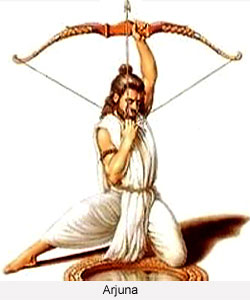 One of the kings of India at that time, Drupada, organized a ceremony for choosing her daughter’s husband, the beautiful Draupadi. The ceremony was called Swayamvara. Draupadi had been a fervent worshiper of Shiva in a past lifetime and she had prayed for receiving his Grace in the form of a husband that is like Shiva. As a consequence of the tapas accumulated in a past lifetime, Draupadi was born from the Fire, during a special ritual performed by her father.
One of the kings of India at that time, Drupada, organized a ceremony for choosing her daughter’s husband, the beautiful Draupadi. The ceremony was called Swayamvara. Draupadi had been a fervent worshiper of Shiva in a past lifetime and she had prayed for receiving his Grace in the form of a husband that is like Shiva. As a consequence of the tapas accumulated in a past lifetime, Draupadi was born from the Fire, during a special ritual performed by her father.
During the swayamvara ceremony, the man who was going to win Draupadi’s hand had to pass one test: he had to shoot the eye of a golden fish fixed on a rotating wheel which was suspended, but he had to do this by looking down, at the reflection of the fish in a bowl of water that was underneath the wheel. He had five tries to shoot the eye. After all the candidates who were eager to win the hand of the beautiful Draupadi have failed, since they weren’t even able to lift the bow up from its stand (a proof of the ego they manifested), Arjuna was the only one capable of passing the test. After humbly saluting the bow, he lifted it without a single strain.
Then he proved his perfect control by aiming and shooting the eye of the fish on his first try. In Hindu tradition, the fish is, among others, a symbol of Kama, god of desires. By looking into the water reflection, which is a symbol of Maya, Arjuna’s arrow pierces (the arrow symbolizes the sharpness of Buddhi – the discerning intellect) the veil of illusion covering reality and thus, he reaches the Truth.
From these perspectives, we are no longer intrigued by the fact that, later on, Arjuna was chosen by Krishna to become his most beloved friend and disciple.
Only God ensures triumph
Before the decisive battle of Kurukshetra, the two antagonists, Arjuna and Duryodhana had the idea of asking Krishna for help. Duryodhana got there first, but because Krishna was sleeping, he sat on a chair at his head. Arjuna got there second and he sat on his knees at Krishna’s feet. When he woke up, Krishna sees Aruna first and he gives him the possibility of choosing first what kind of help to receive: either Krishna’s army, or Krishna himself, who had decided that he won’t use make use of any weapons.
Arjuna immediately chose Krishna, to Duryodhana’s delight, who just got himself the help of a powerful army. But he wasn’t aware of the fact that the result of the battle had already been decided in favor of Arjuna. A loss was impossible for the Divine Krishna, who was now on Arjuna’s side.
The realization of divine will
Upon getting on the battlefield and seeing that his adversaries are his own family, his grandfather, his cousins and all his loved ones, Arjuns is deeply disturbed, he puts down his bow and he says that his heart does not allow him to fight. He would rather give up his kingdom. But Krishna tells him of his divine teaching, causing him to act in a divine, integrated manner. Krishna’s initiation had an immediate effect on him due to the necessary qualities he already had in his being (focus, power of discrimination, inner force, determination, perseverance, noblesse, the power of being detached and… one more essential thing!).
Arjuna understands and assumes the realization of divine will, taking on a perspective which transcends any ordinary human conditioning. Divine victory is inevitable.
Purity of the heart
Krishna refers to Arjuna as Anagaha, which means The one with an absolutely pure heart, or the one without a sin. On the 17th day of the war at Kurukshetra, when Karna, one of the most cruel, ruthless and unjust enemies, was struggling to get his chariot out of the mud, Arjuna did not want to kill him. This proves self-possession and self-control. The noble nature of Arjuna manifests in this state of generosity that he proves after his victory and in his compassion towards his enemies. He bears all the injustice of the Kauravas and yet he does not want to kill them in battle.
DEVOTION
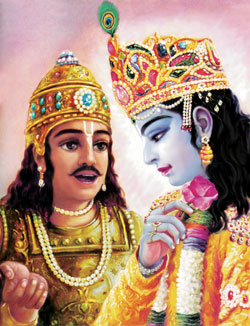 However, Arjuna was far from being perfect. He was impulsive and this often led him to wrongful action or rushed judgments. On one occasion he nearly killed his brother for insulting his bow, then he wanted to kill himself for regretting his earlier impulse. And every time, Krishna was the one that tactfully determined Arjuna to change his mind. And then, what determined Krishna to choose him, Arjuna, as a disciple and vessel of his manifestation for his divine will? Why didn’t he choose other great fighters who were seemingly equal or even superior to Arjuna, such as Karna, Drona or Bhishma? They were the other three great warriors of those times, who ended up fighting in the final battle on the side of adharma, against Krishna and Arjuna.
However, Arjuna was far from being perfect. He was impulsive and this often led him to wrongful action or rushed judgments. On one occasion he nearly killed his brother for insulting his bow, then he wanted to kill himself for regretting his earlier impulse. And every time, Krishna was the one that tactfully determined Arjuna to change his mind. And then, what determined Krishna to choose him, Arjuna, as a disciple and vessel of his manifestation for his divine will? Why didn’t he choose other great fighters who were seemingly equal or even superior to Arjuna, such as Karna, Drona or Bhishma? They were the other three great warriors of those times, who ended up fighting in the final battle on the side of adharma, against Krishna and Arjuna.
The difference between Arjuna and the others did not reside in their fighting prowess, nor their education or their level of preparation and not even in the firm principles that all these fighters believed in, but in their choices regarding the inner values they embraced. Mahabharata shows us that all four of them were great men, but three of them have failed in fulfilling what is truly righteous and divine and only one of them, Arjuna, remained a hero admired by all the following generations. Let us see what we can learn from here.
Karna
Karna was a great warrior, in many ways even greater than Arjuna. Even though they were both equally skilled with a bow, physically, Karna was by far the stronger of the two. Even in respecting principles, Karna seemed to be more stable compared to Arjuna. But there was a weak point in Karna’s life which was fatal to him. His friendship and loyalty to the usurper king Duryodhana was above everything for him, even more important than God.
Although loyalty is an essential quality, when it goes beyond the direct call of the divine, this misunderstood loyalty can turn into the cause of a potential tragic ending. Karna used all his might to serve his friend, Duryodhana, with no selfish thought, without wanting anything for himself. However, his loyalty was blind and lacking discrimination, disconnected from the heart and spiritual values. He followed his friend blindly even when he started to act in an entirely wrong and selfish manner. This caused him to end up tragically. His story serves as a warning for us to always choose wisely, nothing but the calling of the divine.
Bhishma
Bhishma was another being who refrained from any selfish action throughout his entire life. He was a great man, a respected erudite. But he ended up fighting for adharma as well, against the divine will and he had a tragic ending. He was basically an obstacle in the way of building the divine kingdom. Why? Because he placed the oath he took by his own will on a pedestal and turned it into the central point of his life, perhaps even his obsession. His oath was that he would unconditionally follow anyone would become the king of Hastinapur. He never broke his oath, which he took willingly, as long as he lived, not even when this meant fighting against his beloved nephews, who were innocent and he knew this.
Respecting an oath is important, especially nowadays, when people make promises they break the next day (or even the next second). But the Mahabharata shows us that, if the attachment to a personal oath stops you from doing the obvious divine good deed or, on the contrary, it causes you to serve evil, such an oath which is not taken with God must be removed at once.
Bhishma put his oath above everything, even when his oath turned into an instrument of evil. He disregarded Krishna’s advice of renouncing his oath in favor of a much greater good.
Dronachariya
Drona was in service for the king of Hastinapur and his job was to educate all the princes in the kingdom in the art of war or the art of state leadership. He was considered to be the greatest teacher of his time. He was paid generously for his services and before he was hired he was very poor, therefore he was extremely grateful to king Duryodhana. When the king acted wrongfully, against the greater Good, Drona was perfectly aware of this and even if sometimes he tried to stop Duryodhana, he always gave into the king’s answer: “Do not bite the hand that feeds you”.
When the battle inevitably began, drone fought on Duryodhana’s side and he was killed after a turn of events caused by Krishna. Drona, despite being a truly exceptional fighter and a knower of morality, put his loyalty towards his employer before the divine will. Even though he knew what the divine good was, in fact he never had the courage to leave and to tell the king: “Enough! What you are doing is wrong, and I will not support you from now on.” He was too scared of being considered ungrateful.
Drona put his loyalty for his employer before the divine command of Krishna, who tried to convince Drona not to be on the evil side, due to his wrongfully used loyalty.
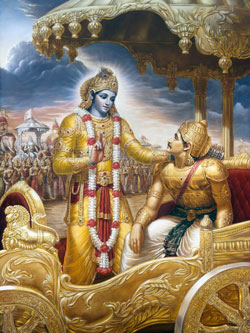 Coming back to Arjuna, in spite of his small flaws, Arjuna had a great quality, maybe even more important than other qualities, one who separated him from the others, giving him not only prosperity in life but also a great fate. For Arjuna, the words of Krishna, who was God incarnate, were absolute.
Coming back to Arjuna, in spite of his small flaws, Arjuna had a great quality, maybe even more important than other qualities, one who separated him from the others, giving him not only prosperity in life but also a great fate. For Arjuna, the words of Krishna, who was God incarnate, were absolute.
His devotion towards Krishna was above everything. He shrugged off any personal note, he was fully committed, he followed the advice and he embraced guidance with all his being. And thus he was able to benefit from the indescribable grace of Krishna.
Seeing his spirit complete and unlimited by sacrifice and his determination in the re-establishment of divine justice, Krishna said that there is no one more beloved to him in this world and there is nothing he could refuse to him. He even said that he could not live in a world in which there is no Arjuna, not even for a moment, calling him the Purusharshava, the best of men.
In conclusion
Having a clear perspective, we can easily feel the divine aspects in the people around us, who are expressing them. But once we’ve felt them, as disciples of God, there is nothing that could bring him within us, in His full plenitude, that we should cast away.
The differences that echo in eternity, within us and around us, are given by our attitudes and choices from this very moment. And our attitudes towards the spiritual guide are always the expression of what we become in the deepest corner of our being.
yogaesoteric
May 2015
Also available in:
 Română
Română
